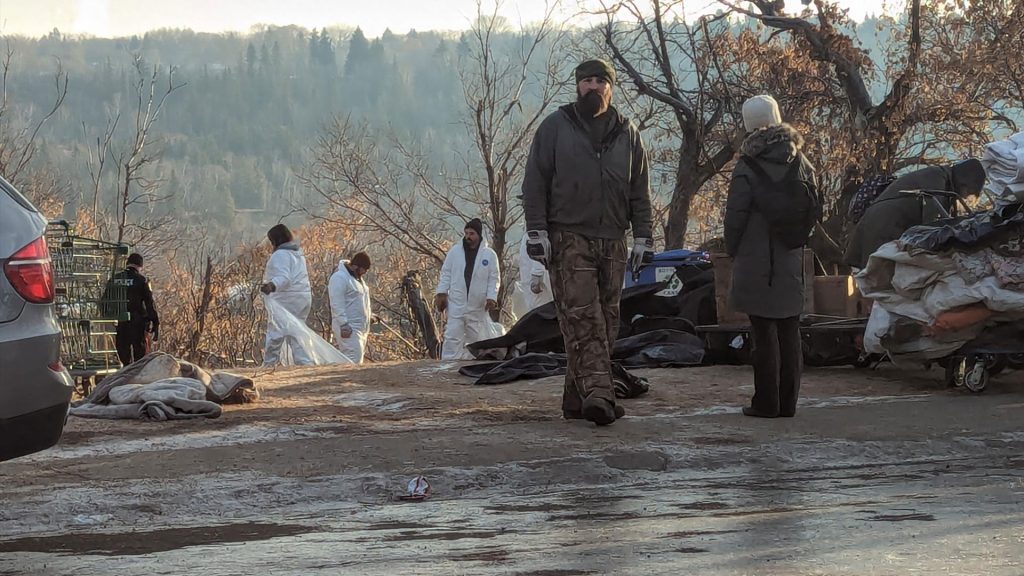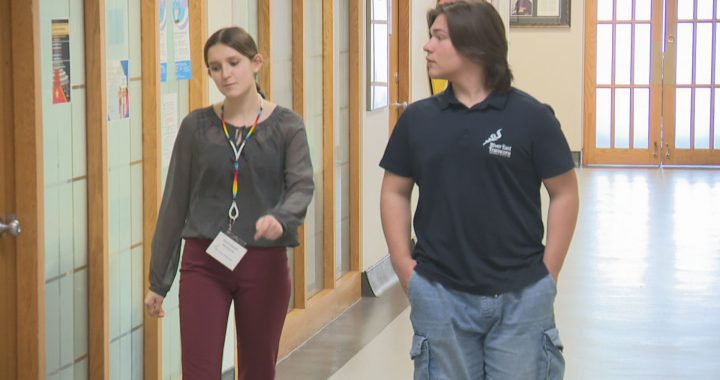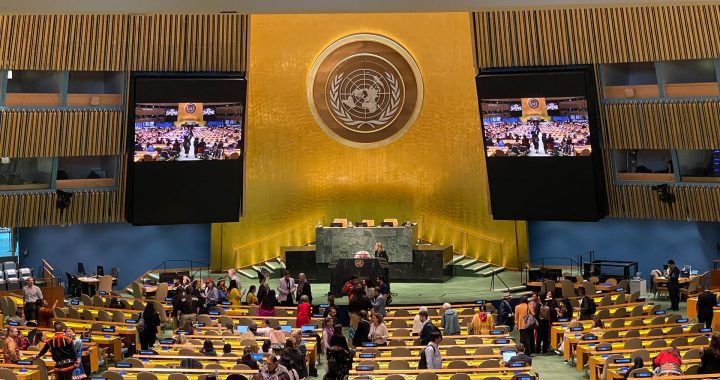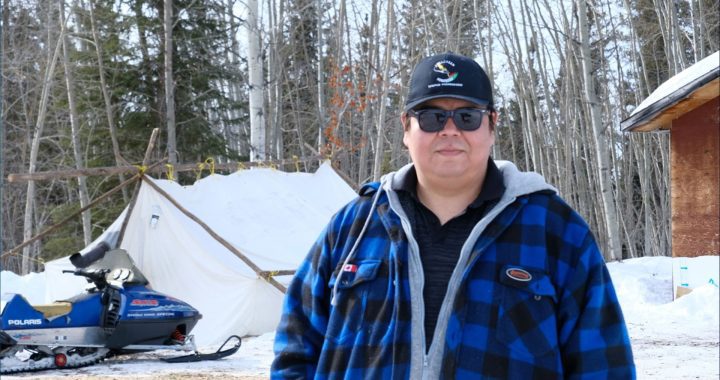
Police tearing down a homeless encampment in Edmonton. Photo: Chris Stewart/APTN.
Undefined Indigenous cultural supports and liaisons to be offered at a navigation centre to be opened to support homeless people removed from encampments being torn down in Edmonton are not good enough says the co-founder of Tawaw Outreach Collective.
“Given most unhoused people in the city are Indigenous, they should have an entirely Indigenous-run triage centre, not just the option of cultural support,” said Rachelle Gladue. The collective is an Indigenous-led organization that provides street outreach and promotes Indigenous harm reduction.
On Wednesday, the Alberta government, backed by the Confederacy of Treaty 6, put into place a plan to do away with encampments popping up in Edmonton.
“We’ve got to act now, because people are dying. The encampments are not a safe spot for anybody to live,” said Treaty 6 Grand Chief Cody Thomas, who is also chief of the Enoch Cree Nation.
Thomas joined other members of the Edmonton Public Safety Cabinet Committee (EPSCC) to make the announcement that as encampments are torn down, free bus transportation will be provided for those who become homeless again as a result to access a new navigation and support centre now operating out of the Karis Centre in the Hope Mission shelter on 107 Street in the downtown core.
“We’re at the table to assist in finding those resolutions and not standing outside protesting,” said Thomas.
The navigation centre will provide health services, shower, food and wraparound services for homeless people, including addictions treatment and mental health services. It will also provide care for pets, secure storage for personal items, and access to other shelter spaces in Edmonton.
The navigation centre was announced the day after Court of King’s Bench dismissed a lawsuit, brought by the Coalition for Justice and Human Rights against Edmonton, seeking an injunction over the city’s encampment removal policy.
The announcement also came a day after Edmonton City Council declared an emergency on housing and homelessness.
Edmonton Police Services (EPS) Chief Dale McFee made it clear that “there are zero circumstances in which allowing these (encampments) to continue is okay.”
McFee and Public Safety and Emergency Services Minister Mike Ellis said encampments were rife with drug and gang activity, organized crime, human trafficking, violence and death, and structural concerns.
McFee was also a member of the EPSCC, which was struck and chaired by Alberta Premier Danielle Smith in November. Ministries represented on the committee included Justice, Health, Municipal Affairs, Public Safety and Emergency Services, Seniors, Community and Social Services, Children and Family Services, Mental Health and Addiction, and Indigenous Relations.
Eight encampment sites deemed high-risk have been closed and cleaned up since Dec. 29, 2023 with at least 100 people displaced.
Gladue was joined by Public Interest Alberta and the Coalition for Justice and Human Rights in opposing the actions undertaken by the city, through its police force, and the province.
“We do advocate for folks to have that self determination of whether they would rather sleep outside or choose a shelter that’s available currently,” said Gladue.
That position is based on a number of factors, she adds, including inadequate housing numbers, a long wait list for housing supports and supportive housing, and the questionable safety of the current shelter system.
Gladue, who works for Boyle Street and is a third-year student taking Indigenous social work, said while McFee may speak about improvements at shelters, her interactions with homeless living in the encampments indicates that safety in shelters is still a concern.
Over the recent severe weather cold snap where temperatures dropped to minus-50 degrees Celsius with wind chill, Edmonton shelters are averaging about 83 per cent full.
While Gladue agrees some encampments are unsafe, “painting the entire thing with the same brush is fear-mongering people to believe that people who are unhoused are just dangerous.”
However, McFee was clear that “calling encampments unsafe is not criminalizing homelessness and to be very, very clear, homelessness and housing is not a root cause of crime. Period. Encampments are unsafe because they allow the conditions where criminals prey on, victimize and inflict violence on our most vulnerable citizens.”
McFee said the speed at which the encampments come down now will be “evaluated every day… (but) we will do so at the speed needed to get the job done.”
New procedures have been in place for when encampments are dismantled, which include people going through the police, who may check identification and arrest individuals if they have outstanding warrants.
McFee did not elaborate on that process, although Minister Ellis said encampment members could go to the navigation centre without going through the police.
“Anyone who’s not going through a law enforcement process… (my department will) make sure that (they) can provide safe, warm access to our social services system and definitely you do not need to go to the police to access the system,” said Ellis.
Police involvement is a concern for Gladue. She points out that numerous homeless people have tickets that they have accumulated for such infractions as trespassing in an LRT underground station in order to stay warm. Accumulated tickets become warrants.
“Then when they go to the triage centre, they’ll check these people if they have warrants. And that’s where they get criminalized. That’s where they get more fines or they go to prison. So it’s just like a cycle. And this is one step along the way,” said Gladue.
When an encampment is torn down, Edmonton Transit Service, assisted by the Alberta Sheriffs, will be on site to provide immediate warmth and shelter, as well as transportation to the navigation centre. Storage bins will be provided for private property to be kept safe and transported to the centre. Pets will be transported with their owners as well, and services will be provided at the centre for their care. Anyone with acute medical care will be transported by emergency medical services to the hospital.
Ellis emphasized that transportation from dismantled encampments to the navigation centre was voluntary. However, he was not clear what would become of those who chose not to be transported.
From the navigation centre, Indigenous homeless could be transported to the Enoch Cree Nation’s just-opened emergency shelter on Edmonton’s northside. Maskokamik (Bear Lodge) will be open 24 hours and provides three meals a day. It presently operates 10 beds as it looks for more staff. Housing workers will help to transition the houseless to permanent housing.
The shelter is being funded in partnership with the province.
Seniors, Community and Social Services Minister Jason Nixon said the Treasury Board had provided $13 million to run the navigation centre, as well as help Edmonton with clean-up costs and transportation.
“We’ll see how this navigation centre works over the next month or two and then make determinations about…what may need to be adjusted, whether or not locations work,” said Nixon.
In spring, the navigation centre is slated to turn into a 100 bed women-only shelter.
Gladue is disappointed but not surprised that neither the police nor the Alberta government spoke to grassroots organizations like hers to get input into their plan before rolling it out.
“It’s them telling us what’s happening and telling us what to do. There’s no real, meaningful collaboration,” she said.
If there had been, she would have suggested autonomy for the unhoused rather than “being forced or subjected to recovery when you know we can’t even offer the bare minimum, which is the right to housing. I would like to see more housing supports, but even just shelter standards need to be improved. And I would like to see less demonizing of unhoused people and painting them with this brush that they’re all criminal or gangs.
But, she admits, she’s losing hope that unhoused people will be treated with “more humanity.”
Story by Shari Narine – Local Journalism Initiative Reporter.










